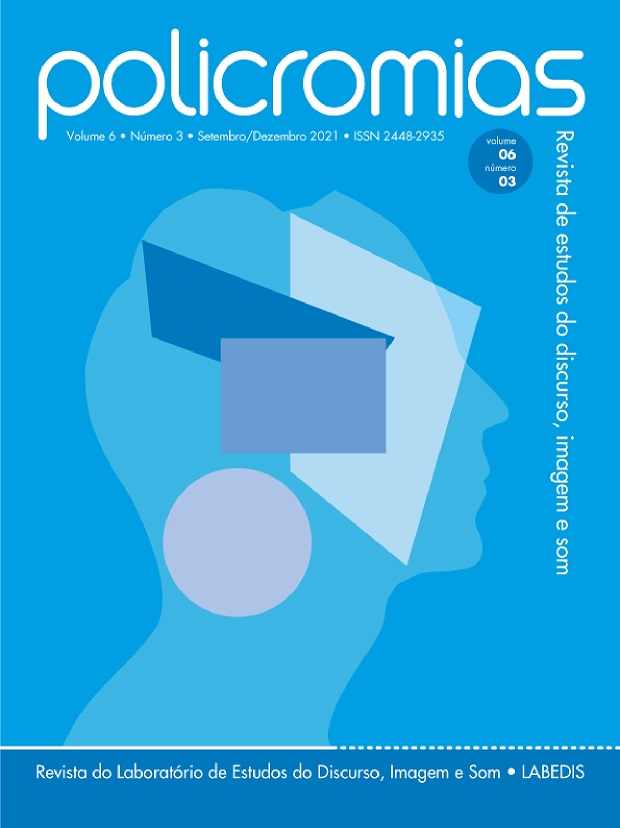MUSILINGUAGEM E EMOÇÕES – PODE A MÚSICA EVOCAR MEMÓRIAS COLETIVAS DE LONGA PERMANÊNCIA?
DOI:
https://doi.org/10.61358/policromias.v6i3.46548Palavras-chave:
Musilinguagem, Cérebro e música, Linguagem., Música e evoluçãoResumo
A presente pesquisa objetiva uma análise do papel exercido pela música nas funções psíquicas superiores e sua função como possível elemento estruturante da linguagem em seus aspectos emocionais e mnêmicos. Analisando os diferentes substratos anátomo-funcionais da música e da linguagem e suas relações com o pensamento e emoção, esse estudo visa o conhecimento do fenômeno musical como elemento de estruturação da linguagem humana. A partir de testes aplicados a voluntários, foi possível demonstrar que, mesmo sem o uso direto da linguagem verbal, determinadas melodias são capazes de provocar memórias e identificações semelhantes e recorrentes em um número expressivo de indivíduos. Essa conclusão sinaliza para a hipótese de uma memória musical de longa permanência, na espécie humana, e cria novos caminhos para suas possíveis aplicações e estudo na psicologia, na musicologia, na musicoterapia e na medicina.
Downloads
Referências
BROWN, S. “The musilanguage model of human evolution”. In: The Origins of Music. N.L. Wallin, B. Merker & S. Brown (Eds.), (pp. 271-300). Cambridge, Mass: MIT Press. 2000.
BROWN S. “A Joint Prosodic Origin of Language and Music”. In: Front Psychol., 30;8:1894, Oct. 2017.
CROSS, I. “Is music the most important thing we ever did? Music, development and evolution”. In: Music, Mind and Science. Suk Won Yi (Ed.). Seoul: Seoul National University Press, pp.10-39, 1999.
CROSS, I. “Music, Mind and Evolution”. In: Psychology of Music, 29(1), 95-102. 2001.
DARWIN, C. The Descent of Man, and Selection in Relation to Sex. London: John Murray, volume1, 1st edition, 1871.
FERREIRA, R. G. F. et al. “A filogênese da linguagem: novas abordagens de antigas questões”. In: Arq. Neuro-Psiquiatr., São Paulo, v. 58, n. 1, p. 188-194, Mar. 2000.
HONING H., CATE C, PERETZ I., TREHUB S. E. “Without it no music: cognition, biology and evolution of musicality”. In: Phil. Trans. R. Soc., B 370: 20140088, 2015.
PATEL A.D. “Music, biological evolution, and the brain”. In: Emerging disciplines (eds Levander C, Henry C.), Houston, TX: Rice University Press, pp. 91–144, 2010.
PERETZ, I. “Brain specialization for music”. In: The Neuroscientist, vol. 8, N.4, pp. 372-380, 2002.
ROGALSKY C, RONG F, SABERI K, HICKOK G. “Functional Anatomy of Language and Music Perception: Temporal and Structural Factors Investigated Using Functional Magnetic Resonance Imaging”. In: Journal of Neuroscience, 9, 31 (10) pp. 3843-3852, March 2011.
SCHYFF, D. V. D. “Music, Culture and the Evolution of the Human Mind: Looking Beyond Dichotomies”. In: Hellenic Journal of Music Education, and Culture, Vol. 4, Article 1, jan 2013.
TOLBERT, E. “Music and meaning: An evolutionary story”. In: Psychology of Music, 29 (1), 84-94, 2001.
TOMASELLO, M. “The Cultural Origins of Human Cognition”. In: Harvard University Press. Cambridge, Massachusetts. London, England, 1999.
TREHUB, S. E. “Musical predispositions in infancy: An update”. In: The Cognitive Neuroscience of Music. Peretz & R. Zatorre (Eds), (pp. 3-20). New York: Oxford UP, 2003.
VAN DER SCHYFF R., and SCHIAVIO A. “Evolutionary Musicology Meets Embodied Cognition: Biocultural Coevolution and the Enactive Origins of Human Musicality”. In: Frontiers in neuroscience, vol. 11 519. 29, Sep. 2017.
ZATORRE R.J., GANDOUR J.T. “Neural specializations for speech and pitch: Moving beyond the dichotomies”. In: Philos Trans R Soc Lond B Biol Sci, 363(1493):1087–1104, 2008.
ZATORRE Robert J., SALIMPOOR Valorie N. “Music perception and pleasure”. In:
Proceedings of the National Academy of Sciences, 110 (Supplement 2) 10430-10437, Jun 2013.

